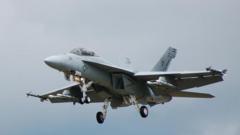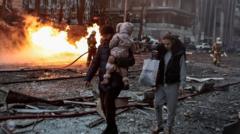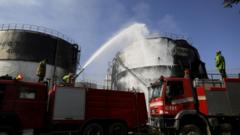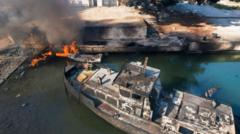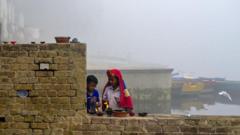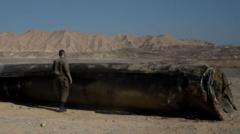The United States is conducting an investigation into the unauthorized release of classified documents outlining Israel's military response plans to attacks from Iran, potentially impacting diplomatic ties.
US Investigates Classified Leak on Israel's Military Plans Against Iran

US Investigates Classified Leak on Israel's Military Plans Against Iran
The leak raises concerns regarding intelligence security and international relations between allies.
The US is currently scrutinizing a breach of security regarding classified documents that detail an assessment of Israel's military strategies towards Iran, as confirmed by House Speaker Mike Johnson. These documents, reported to be shared online, reveal images indicating preparations by Israel in light of recent missile attacks from Iran.
The leak reportedly occurred last week, with the documents being of a top-secret classification that could typically be shared among the Five Eyes alliance, which includes the US, UK, Canada, Australia, and New Zealand. Johnson expressed concern, highlighting serious allegations and a commitment to investigating the matter further.
Israel's military strategy seems to be under meticulous preparation, with reported statements from Israeli officials indicating future strikes would be "deadly, precise and surprising." The documents noted in reports by CBS and the BBC allege attribution to US intelligence bodies, namely the National Geospatial Intelligence Agency and the National Security Agency (NSA).
The issue has sparked intensified scrutiny, especially as it confirms US surveillance and intelligence-gathering activities on its close ally, Israel. One of the documents even brings forward references to Israel’s nuclear capabilities despite a mutual policy of non-acknowledgment by both countries.
Investigators are exploring whether the data was leaked intentionally from a US operative or potentially compromised through cyber intrusions. Insights from the documents suggest they are based on satellite intelligence acquired on the 15-16 October timeframe, addressing military exercises and drone activities indicative of impending action against Iran.
President Joe Biden acknowledged having "a good understanding" of Israel’s forthcoming response but remained tight-lipped about specifics. This incident further complicates the already tense dynamics between the involved countries amidst ongoing military confrontations and the delicate geopolitical landscape of the region.
The leak reportedly occurred last week, with the documents being of a top-secret classification that could typically be shared among the Five Eyes alliance, which includes the US, UK, Canada, Australia, and New Zealand. Johnson expressed concern, highlighting serious allegations and a commitment to investigating the matter further.
Israel's military strategy seems to be under meticulous preparation, with reported statements from Israeli officials indicating future strikes would be "deadly, precise and surprising." The documents noted in reports by CBS and the BBC allege attribution to US intelligence bodies, namely the National Geospatial Intelligence Agency and the National Security Agency (NSA).
The issue has sparked intensified scrutiny, especially as it confirms US surveillance and intelligence-gathering activities on its close ally, Israel. One of the documents even brings forward references to Israel’s nuclear capabilities despite a mutual policy of non-acknowledgment by both countries.
Investigators are exploring whether the data was leaked intentionally from a US operative or potentially compromised through cyber intrusions. Insights from the documents suggest they are based on satellite intelligence acquired on the 15-16 October timeframe, addressing military exercises and drone activities indicative of impending action against Iran.
President Joe Biden acknowledged having "a good understanding" of Israel’s forthcoming response but remained tight-lipped about specifics. This incident further complicates the already tense dynamics between the involved countries amidst ongoing military confrontations and the delicate geopolitical landscape of the region.

